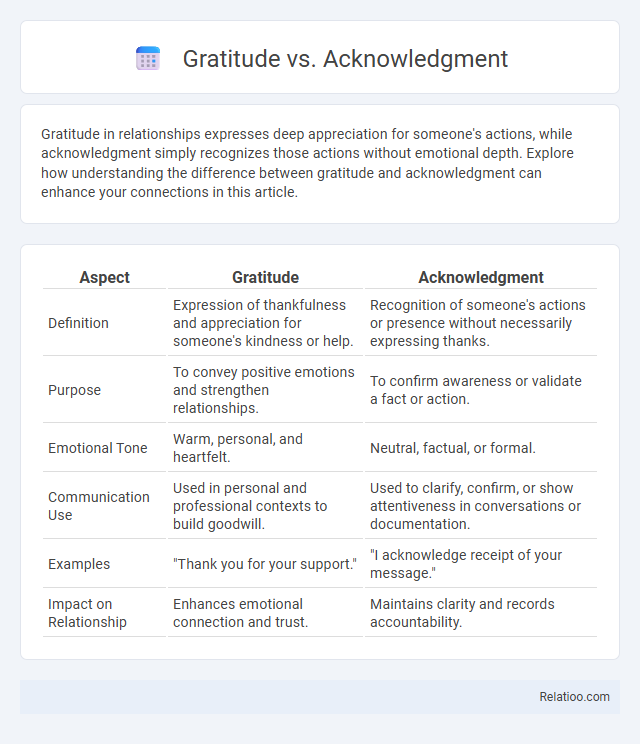Gratitude in relationships expresses deep appreciation for someone's actions, while acknowledgment simply recognizes those actions without emotional depth. Explore how understanding the difference between gratitude and acknowledgment can enhance your connections in this article.
Table of Comparison
| Aspect | Gratitude | Acknowledgment |
|---|---|---|
| Definition | Expression of thankfulness and appreciation for someone's kindness or help. | Recognition of someone's actions or presence without necessarily expressing thanks. |
| Purpose | To convey positive emotions and strengthen relationships. | To confirm awareness or validate a fact or action. |
| Emotional Tone | Warm, personal, and heartfelt. | Neutral, factual, or formal. |
| Communication Use | Used in personal and professional contexts to build goodwill. | Used to clarify, confirm, or show attentiveness in conversations or documentation. |
| Examples | "Thank you for your support." | "I acknowledge receipt of your message." |
| Impact on Relationship | Enhances emotional connection and trust. | Maintains clarity and records accountability. |
Understanding Gratitude: Definition and Importance
Understanding gratitude involves recognizing and appreciating the positive aspects of life and the kindness received from others, which fosters emotional well-being and stronger social connections. Acknowledgment refers to the act of recognizing someone's effort or presence without necessarily feeling thankful, while gratitude is a deeper emotional response that combines recognition with appreciation. You can enhance your mental health and relationships by cultivating genuine gratitude, which encourages mindfulness and a positive outlook.
What Is Acknowledgment? Meaning and Scope
Acknowledgment is the explicit recognition of someone's efforts, presence, or contributions, serving as a foundational social and professional practice that fosters trust and respect. Unlike gratitude, which conveys a deeper emotional appreciation, acknowledgment focuses on objectively validating actions or circumstances without necessarily expressing personal feelings. You can enhance relationships and communication by understanding acknowledgment's scope as both a simple nod to facts and a powerful tool for reinforcing positive interactions.
Key Differences: Gratitude vs Acknowledgment
Gratitude involves a deep emotional appreciation and thankfulness often directed towards someone who has done something meaningful for you, while acknowledgment simply refers to the recognition or acceptance of a fact or situation without necessarily expressing emotional feelings. Your gratitude is personal and heartfelt, indicating value and emotional connection, whereas acknowledgment is more neutral, serving as an objective confirmation or validation. Understanding these key differences helps you effectively communicate appreciation versus recognition in various contexts.
Emotional Impact of Gratitude
Gratitude evokes a deep emotional response by fostering feelings of warmth, appreciation, and connection, which can enhance your overall well-being and resilience. Unlike acknowledgment, which is simply recognizing someone's actions or efforts, gratitude engages the heart and nurtures positive relationships through sincere appreciation. Consistent practice of gratitude rewires the brain to focus on positive experiences, amplifying emotional benefits far beyond mere acknowledgment.
The Role of Acknowledgment in Relationships
Acknowledgment in relationships involves recognizing and validating others' feelings, efforts, and perspectives, which fosters trust and emotional connection. Unlike gratitude, which expresses thankfulness for benefits received, acknowledgment focuses on affirming presence and experience, essential for healthy communication and mutual respect. Effective acknowledgment minimizes misunderstandings and strengthens bonds by ensuring each party feels heard and valued.
Practical Ways to Cultivate Gratitude
Cultivating gratitude practically involves recognizing and appreciating specific positives in Your daily life through mindful acknowledgment and intentional reflection. Writing daily gratitude journals, verbally expressing thanks to others, and focusing on small yet meaningful experiences enhance emotional well-being and deepen interpersonal connections. Differentiating gratitude from acknowledgment lies in gratitude's emotional engagement, while acknowledgment simply notes facts, making gratefulness a powerful tool for fostering resilience and positivity.
Effective Techniques for Offering Acknowledgment
Effective techniques for offering acknowledgment include specific recognition of individual efforts, timely feedback, and personalized expressions of appreciation that resonate with the recipient's values. Unlike gratitude, which is a more general feeling of thankfulness, acknowledgment focuses on explicitly validating actions and contributions, fostering motivation and engagement. Utilizing clear, sincere, and contextually relevant language enhances the impact of acknowledgment, making it a powerful tool in professional and personal relationships.
Gratitude in the Workplace: Benefits and Examples
Gratitude in the workplace enhances employee engagement, boosts morale, and fosters a positive organizational culture by recognizing individual and team contributions. Expressing gratitude through personalized thank-you notes, public recognition, and reward systems leads to increased job satisfaction and productivity. Companies that prioritize gratitude report lower turnover rates and stronger collaboration among employees, driving overall business success.
Acknowledgment in Leadership and Team Building
Acknowledgment in leadership is essential for fostering an inclusive and motivated team environment, as it validates individual contributions and encourages open communication. Unlike gratitude, which expresses thankfulness, acknowledgment specifically recognizes effort and competence, reinforcing positive behaviors and driving performance. Effective acknowledgment enhances trust, boosts morale, and cultivates a culture of respect, leading to stronger collaboration and improved team dynamics.
Integrating Gratitude and Acknowledgment in Daily Life
Integrating gratitude and acknowledgment in daily life enhances emotional well-being by fostering appreciation and recognition of others' contributions. Practicing gratitude involves expressing heartfelt thanks for positive experiences, while acknowledgment emphasizes recognizing efforts and achievements without necessarily attaching emotion. Daily habits like journaling specific thankful moments and verbally acknowledging colleagues' work create a balanced mindset that strengthens relationships and promotes a supportive environment.

Infographic: Gratitude vs Acknowledgment
 relatioo.com
relatioo.com